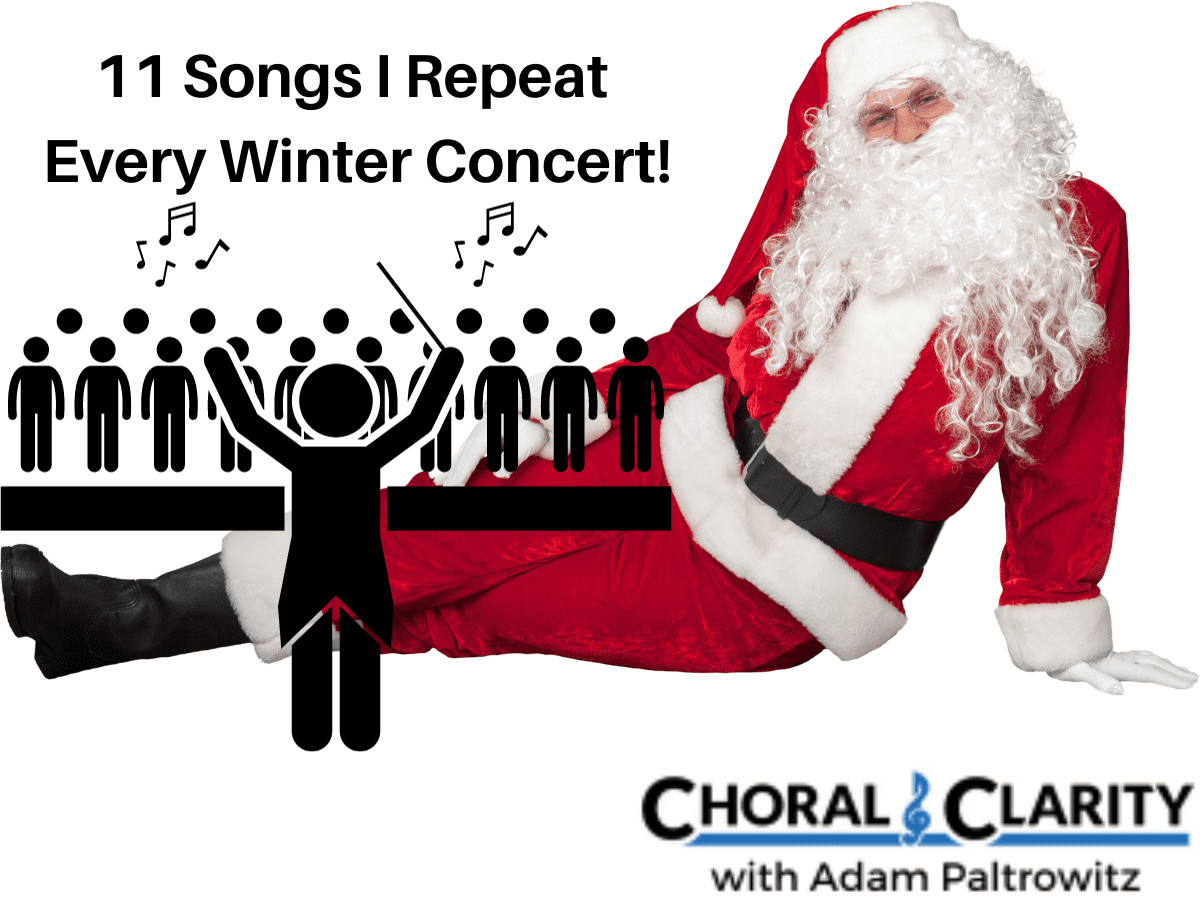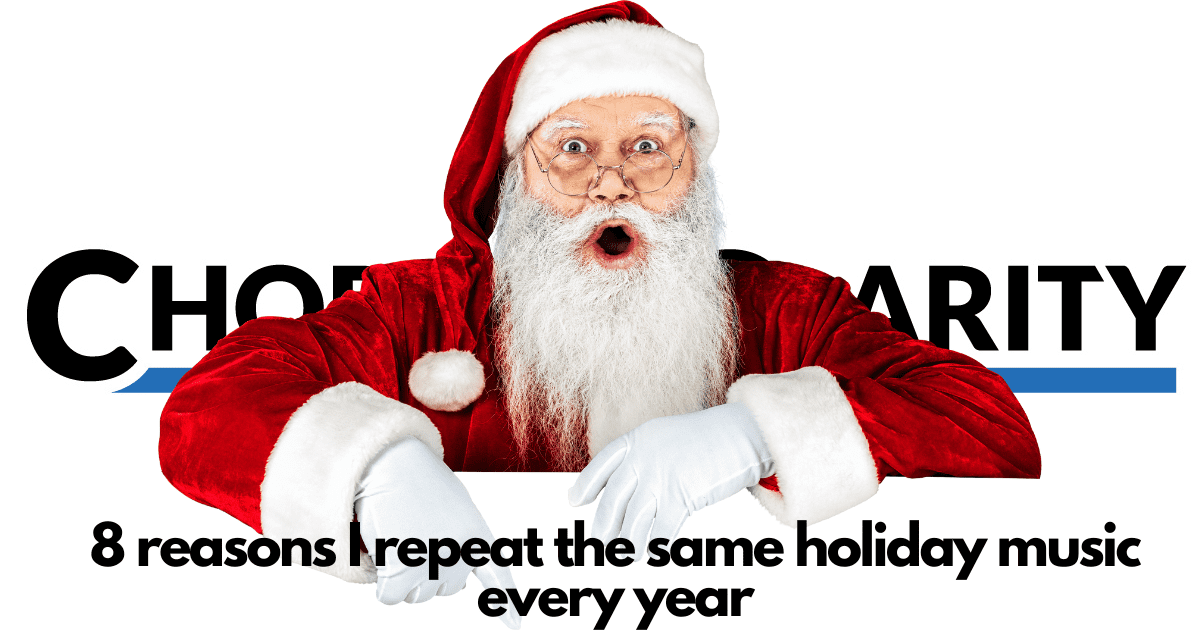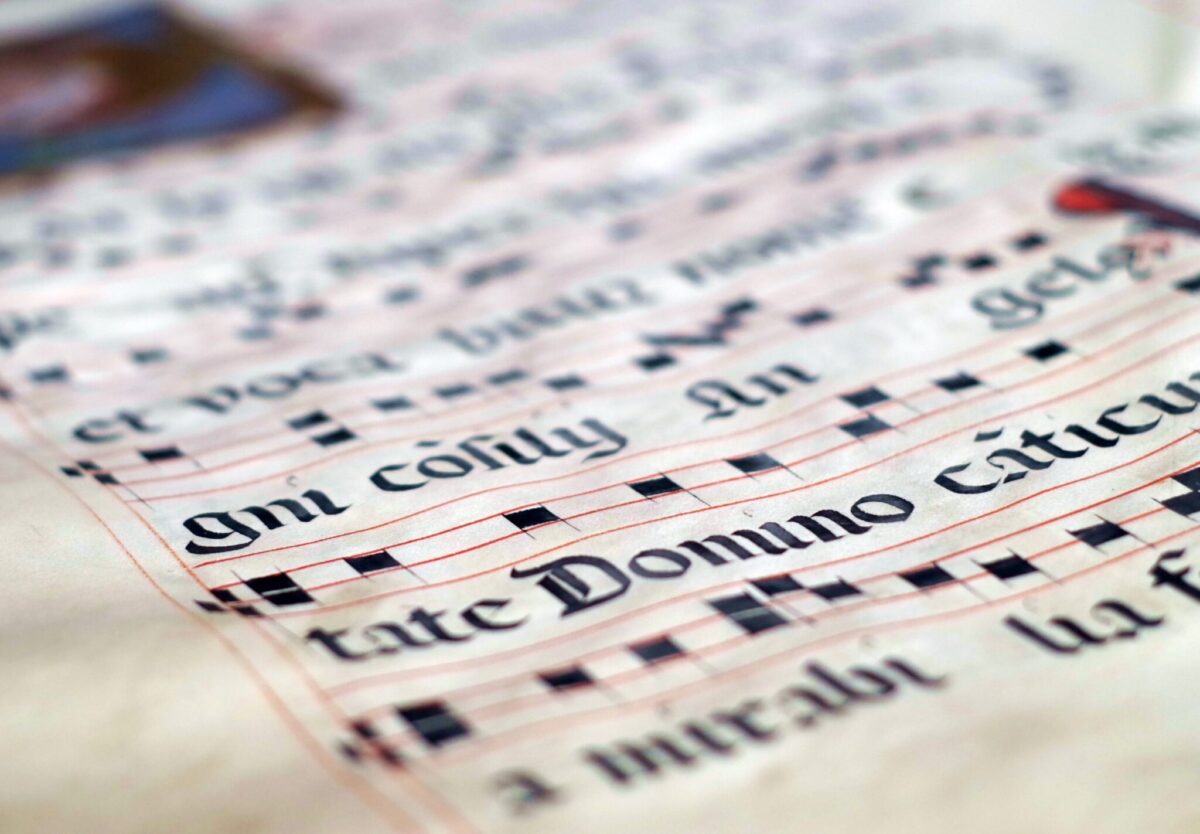The vacation is so clearly here and everyone has one foot out the door. We may have just held our holiday concert and are struggling to “fill” the last few days before the break. The students appear rowdy, disinterested, or a combination of the two. What are we going to do?
How do we “Fill” Those Last Few Rehearsals Before Break?
The first way we do this is by eliminating the concept of “filling” time; instead, we can re-frame the goal of these pre-break rehearsals with “the ability to explore, enhance, and unify an ensemble without the pressures of an upcoming concert.”
I believe we need to train our students to think beyond the concert the same way students in other academic areas need to think beyond tests.
Try SIGHT READING FACTORY and save 10% using code: choralclarity
There are two main goals for creating enriching pre-vacation rehearsals:
- to actively engage our students
- to connect students to one another with a collective purpose that improves the ensemble
I think of the days before a break (and after a concert) as self-contained; I believe in setting specific goals and activities that are limited to this rehearsal time (anywhere from 1-5 days after a concert and/or before a break).
Before I list 7 activities and ideas that can enrich your students right before the Winter Recess, there are 4 activities I strongly recommend avoiding:
Here are the 4 commonly chosen activities that I believe are not effective uses of pre-break rehearsal time:
1. Watching a movie
Unless the movie is highly specific to your curriculum AND guided questions are given, I believe this activity will come across as a free period. Students will not be actively engaged, nor will they have a collective purpose that improves the ensemble.
2. Viewing an audio/video recording of your recent concert performance
Students love to watch themselves, and generally will just sing right along. It usually ends up just being a free period with some music in the background. They are usually not actively engaged, nor do they have a collective purpose that improves the ensemble. In my opinion, it’s better to send them a link to the concert and provide them with guided questions for homework. This will allow them to self-reflect and more actively listen. If you truly believe playing the recording in class is important, provide engaging questions that challenge them to listen intently, or have a meaningful discussion after each piece is played.
3. Starting new music for a concert that isn’t happening for several months
When a big vacation is about to happen, most people (students or adults) are not interested in looking beyond the break. Before a break, I still believe in teaching music: choose music with a short-term goal in mind; you may not intend to use this music for any specific future performance.
4. Giving students a free period
A free period is a way to say to your students that they are DONE before their vacation has actually begun. It also says the only thing that matters in your class is the concert.
The days before a break can be really valuable rehearsal time if we embrace them as special rehearsals free from concert pressure (for the students), and ones that offer the opportunity for varied learning approaches while increasing group connectivity.
Here are 7 activities and ideas that can enrich your ensemble members right before the break:
1. Teach a new song by rote
Bring your singers out of their comfort zone. Have them stand and do something totally different. Some examples of pieces that are most effective when taught by rote would be Siyahamba, The Storm Is Passing Over (Barbara Baker), or This is the Day (the piece I’ve attached below as a YouTube link). If this sounds intimidating to you, remember that you can have the music in front of you! The goal is that your singers have no sheet music and respond directly to your voice/piano, gesture, and energy!
Here is Tony Leach, the brilliant choral director (retired) of “Essence of Joy” who demonstrates his approach to teaching by rote. Several years ago, I watched this video and taught this piece by rote to my self-selected high school choir in around 10 minutes. You could even use this video and have your students sing along. All students can remain actively engaged if they learn each other’s parts in the process!
2. Teach rounds
You can effectively teach a round by sight-singing or by rote. Reading a round is a great way for choirs that are not usually keen on reading to experience success quickly. If a round is written on the board, an entire choir can successfully engage and sight-sing together. A simple round like Jubilate Deo, Viva La Musica, Dona Nobis Pacem, or Music Alone Shall Live can provide quick reading success.
You can also teach those same rounds by rote, since everyone can be actively engaged during the learning process. I’ve provided links for free downloads of each round.
See: The 7 Reasons all Choirs Should Sing Rounds & The 5 “Rounds” I Use in my Choral Program Every Year – and WHY!
3. Sing holiday carols
Pass out a bunch of holiday carols and sing them together. Allow singers to improvise. I have several free downloads on my website (Jingle Bells, Joy to the World, Deck the Halls, We Wish You A Merry Christmas, Oh Hanukkah, Dreidel). Since we are not rehearsing for a performance, it’s a great opportunity for students to share the holiday spirit while using singing as their means for connection.
4. Hand out a post concert self-assessment
Without playing a recording of the concert, the students will learn to focus their attention on their individual contribution to the performance as well as the collective efforts of the group. You don’t necessarily need to grade a post concert in order for it to be an effective tool; in fact, you could use it as a starting point for a group discussion. A post concert self-assessment, like the one I have linked here, is a way for students to evaluate specific, tangible aspects of the concert. When students process exactly what was expected of them (individually and collectively), they will gain awareness that could lead to improvement at future concert performances.
5. Facilitate a group discussion about the concert
If your group just performed their concert, this is a great opportunity to have a discussion about their experience. The most important aspect of a group discussion is that we serve as effective facilitators. I would suggest first discussing the “wins” of the concert, followed by what could’ve been better, and concluding with suggestions for future concerts. Each area of discussion includes anything from preparation, repertoire choice, logistics, audience perception, etc. Another great idea is to pose a few questions first as a 5-minute written activity. This will give all students the chance to cull together their thoughts before speaking.
Even if their concert was more than 1 week ago, it’s still possible to have a meaningful discussion. This year, my Winter Concert is Thursday, December 20th, and we won’t have our class discussion until we return on January 3rd.
Here is Ryan Guth’s Choir Ninja Podcast on how to facilitate a productive post-concert group discussion.
6. Have a pre-vacation, in-class celebration rehearsal
The most important goal of the celebration is that it properly aligns with the core values of the class. In my program we have a gift exchange with clue cards. The students must figure out who their secret snow person is based on 3 written clues. First they must correctly identify their secret snow person. Secondly the clue writer hands the clue-guesser their gift. If this is a last minute activity, this could be highly effective without gifts, only clue cards. Students would need to figure out who their “connection” is based on the 3 clues. The goal is for students to write creative clues that get others to know them better.
7. Engage the class in an ice-breaker
There are so many great ice-breakers out there. Find one that suits your group. There are ones that are physical, mental, loud, quiet, etc. Here is a link to a list 40 Free IceBreakers. From this packet, I enjoy the “Four Facts Game”, “Find Someone Game” (very similar to what I mentioned in #6, and the “Birthday Game”.
Additionally, I love the game, “Connection”. In this activity, everyone stands in a large circle. One student says their name and begins talking about themselves. As they divulge random facts, another student who shares the exact same fact in common must immediately cut off the original student by repeating the exact same phrase. The first student sits down in place and the new student introduces themselves and begins speaking about themselves. The connections mixed in with the awkward silence and the funny anecdotes that people share make this game a positive, uniting experience.
If rehearsals before a long vacation consist of effective daily warm-ups, active singing by rote/learning a new round, self reflection/group discussion, and ice-breakers/community bonding, students will likely remain engaged and appreciate choir as more than just a concert-preparation class.
Try SIGHT READING FACTORY and save 10% using code: choralclarity











Leave A Comment